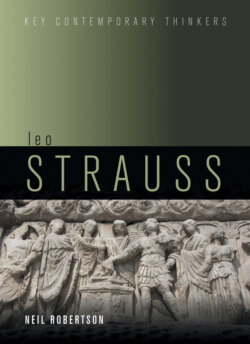Leo Strauss

Реклама. ООО «ЛитРес», ИНН: 7719571260.
Оглавление
Neil G. Robertson. Leo Strauss
Table of Contents
Guide
Pages
Series Title. Key Contemporary Thinkers Series includes:
Leo Strauss. An Introduction
Copyright Page
Dedication
Acknowledgments
Abbreviations of Works by Strauss
Introduction
Who is Leo Strauss?
Themes in Strauss’s Thought
The Return to Natural Right
The Theological-Political Problem
The Exoteric/Esoteric Distinction
Classical Political Philosophy
The Critique of Modernity
The Thesis of this Book
1 Recovering Natural Right in the Weimar Republic
Nietzsche and the Weimar Republic
Strauss’s Relation to Heidegger
Strauss’s Account of Nihilism
Positivism and Historicism
The Recovery of Natural Right
The Second Cave
Notes
2 The Theological-Political Problem
Strauss’s Theologico-Political Predicament
The Discovery of Pre-Modern Rationality and Revelation
The Opposition Between Reason and Revelation: Athens and Jerusalem
Philosophy Defined by its Opposition to Religion
Strauss’s Own Relation to Athens and Jerusalem
The Genealogy of Religion
What is Missing from Strauss’s Account
Strauss as Jewish Thinker
Notes
3 Esoteric Writing and Political Philosophy
Esoteric Writing as Political Philosophy
Modern Esoteric Writing
The Art of Reading Esoteric Writings
The Objectivity of Reading Between the Lines
Strauss’s Writings as Practicing the Art of Esoteric Writing
Notes
4 Recovering Classical Political Philosophy
On Tyranny
Philosophy as Knowledge of Causes vs. Philosophy as Knowledge of Problems
Natural Right and History
Socrates
Strauss’s Account of Dialectics
Natural Right
The Problematic Status of Natural Right
A Pause to Clarify Natural Right at the Level of the City
The Schools of Natural Right
Recovery or Project?
Notes
5 The Critique of Modernity
The Critique of Religion
The Rejection of the Ancient Account of Nature
The Modern Project and its Culmination or Failure in Nihilism
The First Wave
The Second Wave
The Third Wave
Notes
6 Strauss, the Straussians, and America
Straussians
The Cultural and Political Impact of the Straussians
Leo Strauss Today
Notes
Conclusion
Further Reading
Works Cited. Works by Strauss
Works by Authors Other than Strauss
Index
POLITY END USER LICENSE AGREEMENT
Отрывок из книги
Neil G. Robertson
There are specific colleagues and friends who have contributed directly to this book’s composition by reading drafts of chapters and aiding and correcting my thinking and understanding of Strauss: Daniel Brandes, Eli Diamond, Susan Dodd, Mark Henrie, Ken Kierans, Simon Kow, David Peddle, and Henry Roper. I am also very much in the debt of the anonymous reviewers who gave such helpful corrections and suggestions to aid in the final reworking of the book. I am deeply grateful to George Owers and Julia Davies of Polity Press for the invitation to write this book and the care and consideration they have shown both it and me over its somewhat delayed emergence.
.....
Friedrich Nietzsche (1844–1900), while he lived in the nineteenth century, only came to cultural and intellectual prominence in the first decades of the twentieth century and was, by Strauss’s own account, the dominating intellectual presence of the Weimar Republic (1918–33), where Strauss came to intellectual maturity. Nietzsche is famous for his account of European civilization as having been subject to the claim “God is dead.” Nietzsche provided the most radical consideration of the implications of this insight into modern culture: the death of God implied the loss not only of religious belief but of the whole framework of morality and science that depended on the claim of an otherworldly foundation. Nietzsche therefore saw his own time as one that was experiencing nihilism. In the face of the abysmal experience of the death of God, Nietzsche saw as illusionary and unsustainable the claims that the end of religion issued in a new egalitarian humanism and new scientific understanding of the world. Nietzsche proposed an alternative way to live in the face of nihilism through three “teachings”: the world as “will to power”; the proclamation of the Übermensch, the “Overman”; and the doctrine of the Eternal Return of the Same. Nietzsche explores these thoughts in a number of works, but especially central is Thus Spoke Zarathustra. As we shall see, Strauss understood himself as trying to face the demands of Nietzsche’s thought.
Edmund Husserl (1859–1938) was important to Strauss in pointing to a way of philosophizing that might allow for a standpoint that could escape Nietzsche’s devastating critique of the western tradition of philosophy as implicated in the nihilism western culture found itself possessed by. Husserl developed “phenomenology” as a way to engage in a philosophic reflection on the experienced world that avoids the kind of causal or metaphysical approaches to philosophy that dominated western philosophy, and were especially at work in modern philosophy’s turn to questions of knowledge of the external world. Husserl’s phenomenology sought to pre-empt the turn to this kind of knowledge by engaging in a philosophy of the description of things as they appeared to the self, bracketing, or excluding, questions of causality or metaphysics. Strauss was deeply impressed by Husserl and took up his turn to the “natural understanding” – the way things appear to us naturally – as a beginning point for a philosophy that might point a way out of the nihilism of the age.
.....